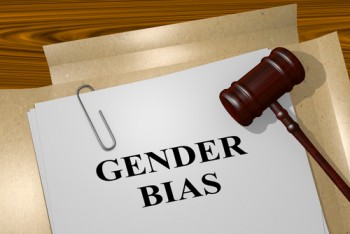Shareholder's $300M suit accuses employment firm Ogletree Deakins of gender bias

Shutterstock.com.
A nonequity shareholder at Ogletree, Deakins, Nash, Smoak & Stewart claims in a $300 million lawsuit that the defense-side labor and employment firm discriminates against female partners in pay, promotions and opportunities.
The would-be federal class action was filed Jan. 12 by shareholder Dawn Knepper, according to a press release, the Recorder and Bloomberg Big Law Business. Knepper is represented by David Sanford of Sanford Heisler Sharp, the same firm that filed gender bias suits against Chadbourne & Parke, and the now-disbanded firm Sedgwick.
On its website, Ogletree Deakins purports to foster diversity and inclusion, “but this rhetoric is largely hollow,” the suit says. “In reality, the firm has shirked its obligations under the law through its ‘do as I say not as I do’ practices.”
The suit says the firm doesn’t give female shareholders the appropriate credit for business they generate and the work they do, doesn’t give women the same development and training opportunities provided to men, and doesn’t select women for business pitches as often as men.
Compensation decisions are controlled by the firm’s predominantly male compensation committee and are approved by a vote of equity shareholders, about 80 percent of whom are men, the suit says. Men also dominate at the nonequity shareholder level, making up 58 percent of the group, according to the suit, which relied on statistics that were current as of last Dec. 31.
The suit says shareholders receive credit for work in five main categories: originating credits, managing credits, responsible credits, working credits, and billable hours. Ogletree puts more emphasis on origination credits and, to a lesser extent, managing credits in its compensation decisions, the suit says.
See also: Pay Up: Female lawyers are working for income fairness—by suing their firms
The originating credit can be divided among several lawyers, but in practice the credit goes to the lawyer who establishes the initial relationship with a client, according to the suit. The originating lawyer “has total discretion to allocate origination credits in perpetuity,” the suit says.
Between 2014 and 2016, the average amount of origination credits for male shareholders was nearly double that of female shareholders, the suit says. Knepper says she has been with the law firm for more than 12 years, and has never been invited on a business pitch to a prospective client.
The firm disproportionately gives administrative duties to women lawyers, which takes up time that could be spent on billable matters, the suit says. Administrative duties include office management, paralegal supervision and training, and event planning. The firm also gives the bulk of actual legal work on cases to women, which doesn’t have a meaningful impact on compensation, the suit says.
The suit seeks $100 million for underpayment, $100 million in compensatory damages, and $100 million in punitive damages. The suit alleges pay discrimination, gender bias and retaliation in violation of Title VII of the Civil Rights Act; violation of the federal Equal Pay Act; violation of California employment law; and unfair competition.
A separate suit seeks a declaratory judgment that Knepper is not bound by any arbitration agreement.
Ogletree Deakins said in a statement that equal opportunity is a core principle at the firm and it doesn’t tolerate discrimination of any kind.
“We take the allegations filed by one California shareholder very seriously,” the statement said. “However, the decision-making process that governs our compensation system is both fair and equitable.
“In fact, we are proud of our ‘open compensation’ system under which all shareholders in the firm know what every other shareholder earns—and the factors that support those determinations. Under this system, full-time female non-equity shareholders in California have made more on average than their male counterparts in each of the last four years. And the same is true if you compare female and male equity shareholders in California.
“We will confidently defend the firm against these claims as we remain steadfast in our commitment to equal opportunity for all. Women comprise more than half of the people in our firm and, over the last four years, the majority of attorneys promoted to shareholder in the firm have been women (8 of the 11 new shareholders just promoted on January 1 are women). Further, women are among our most successful lawyers, serving in leadership positions as members of our board of directors and compensation committee, office managing shareholders and practice group chairs. Of the four elected members of the compensation committee, two are women. All four serve alongside the firm’s managing shareholder.”
The firm has adopted a number of initiatives relating to credit guidelines, pay equity and flexible work policies as a result of a recommendations by a recently formed task force, the statement said. The firm also has appointed its first ombudsperson to help resolve workplace issues.
Updated Jan. 18 to note Knepper is a nonequity shareholder and link to prior ABA Journal coverage.
Write a letter to the editor, share a story tip or update, or report an error.


